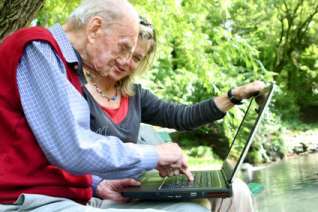 Young people below the age of 24 have grown up with the Internet; they have no knowledge or memory of the world before the web. To them it has always been there. It is no wonder that they are amongst the most highly represented group of people online. Indeed, according to Pew Internet, 98% of people under the age of 29 use the Internet.
Young people below the age of 24 have grown up with the Internet; they have no knowledge or memory of the world before the web. To them it has always been there. It is no wonder that they are amongst the most highly represented group of people online. Indeed, according to Pew Internet, 98% of people under the age of 29 use the Internet.
However, they are statistically much more likely to be online than their grandparents. In the over 65 age group, Internet usage plummets to 56%. Now there is a margin of error in these research figures, so it basically means that nine out of ten young people use the web, whereas only six out of ten pensioners do so.
That’s still the majority of course, but it means the Internet is much more popular in youngsters than oldies.
But look at the figures again. How much of this difference is actually due to age?
More significant are two other factors – education and income. The Internet is a rich person’s world and highly educated rich people at that. Those aged 65 and over had fewer educational opportunities when they were young. Going to university was rare, now it is the norm. Poverty is also significantly more frequent in the over 65s than it is in younger generations.
Having enough money to pay for web access and then having the educational attainment to understand the online world and be able to use it are the real limiting factors. They probably also explain why not everyone under the age of 65 uses the web.
This concept is known as the “digital divide” where the online world favours the rich and well educated. But there appears to be a growing new kind of digital divide – the social skills divide.
New research shows that people who have lots of “friends” and do lots of mobile phone activity report MORE loneliness than those who have fewer friends and use their mobiles less. The “social deficit” theory suggests that people are more lonely when they have less face-to-face contact. This research did indeed find in favour of that theory.
Unexpectedly, though, it found that people with lots of contacts also felt lonely. The chances are these people are spending less time in face-to-face and more time in electronic communication.
Maybe that old-young person digital divide has nothing to do with age, finances or education after all. Maybe it is that the over 65s have realised the value of face-to-face. They know that being offline is better for them psychologically. Perhaps we should be encouraging those rich college kids to stop using the Internet so much. We could be creating a whole new kind of digital divide.
